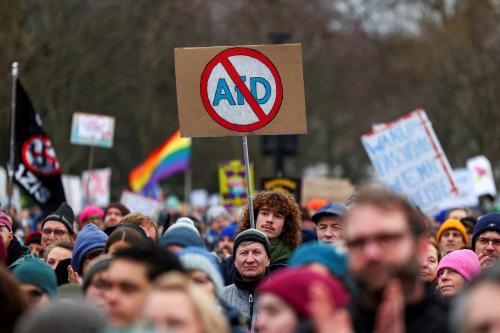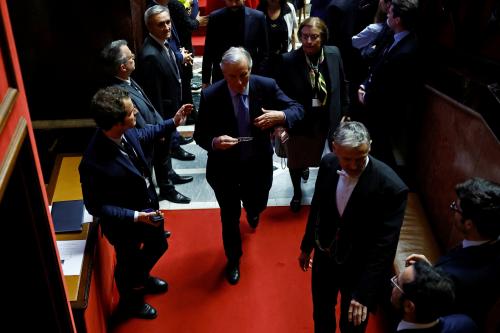The future of democratic reform is at stake in the upcoming presidential elections in Poland. Depending on who wins, the new president is likely to either advance or stymie efforts to redress the earlier erosion of democracy.
In the first round of voting on May 18, the front-runner was Rafał Trzaskowski, with 31.4% of the vote. Trzaskowski is the mayor of Warsaw, who is affiliated with the governing coalition of the center-right Civic Platform (Platforma Obywatelska, PO). His main rival, running very closely behind with 29.5% of the vote in the first round, is Karol Nawrocki, the head of the Institute of National Remembrance and an affiliate of the right-wing populist Law and Justice (Prawo i Sprawiedliwość, PiS) party, which governed Poland from 2015 to 2023. The decisive runoff will be held on June 1.
Why this election matters
Why does the presidential election matter so much? After all, presidents in Poland are mostly figureheads and rarely initiate legislation. They can, however, veto legislation passed by the parliament, and only a parliamentary supermajority can overturn the veto. Presidents can also refer bills to the Constitutional Tribunal, which can delay the parliamentary vote. (The presidency was initially far more powerful in the new Polish democracy after 1989, but following the tumultuous 1990-1995 presidency of Lech Wałęsa, the new Constitution of 1997 has constrained presidential powers to appoint ministers, veto budgets, or dissolve parliament.)
The current president, Andrzej Duda (affiliated with PiS), has made the most of these limited powers. Duda has vetoed much of the legislative agenda of Prime Minister Donald Tusk (PO) and the reforms designed to undo the controversial policies of the former PiS coalition, including critical bills to restore the judiciary’s independence. He has vetoed proposals such as the new government’s move to shut down the public broadcaster (which served as a PiS mouthpiece), and a bill to allow over-the-counter access to the morning-after pill for women and girls aged over 15 years old in Poland. Duda has also refused to accept the nominations of judges, generals, ambassadors, professors, and government ministers.
Duda has sent many other coalition legislative proposals to the Constitutional Tribunal. This is a de facto veto, since PiS has appointed and supported the majority of the court’s judges. These judges are then able to delay the parliamentary votes on legislation until they rule on its constitutionality. As a result, PiS’s earlier undermining of the rule of law is now hindering the PO coalition’s efforts to return to the rule of law.
Much of the damage to Polish democracy wrought by the previous PiS coalition remains to be undone. In power between 2015 and 2023, PiS has been accused of undermining the rule of law and democracy in Poland, politicizing the judiciary, attacking judges critical of these changes, turning the state-owned media into a government propaganda mouthpiece, suborning the Central Anticorruption Bureau and other independent agencies, ignoring European Union (EU) rulings, targeting migrants, and attempting to centralize executive power. Indicators of democratic performance show a significant drop in quality of democracy ratings under its rule.
Is there a clear front-runner?
With the stakes this high, the governing coalition needs a sympathetic president, but so far, the election campaign has not produced a clear-cut frontrunner. Trzaskowski’s support has fallen, but polls still show him ahead of Nawrocki. Theories abound for why his support as declined, ranging from the chaos at the first presidential debate and Trzaskowski’s failure to dominate it, to Nawrocki transforming himself from a dark horse candidate to a more familiar, tough-guy politician who looks like he would be a decisive leader.
Yet Nawrocki himself has recently come under fire in a series of incidents that have made international news. Most notably, he was found to own a second apartment, despite declaring in a public debate that he owned only one. Nawrocki apparently obtained the asset from the 80-year-old man for whom he was the legal guardian, and despite initial denials and denunciations by PiS, the scandal refuses to die. In an earlier controversy, he met briefly with U.S. President Donald Trump in May, a meeting that was lauded by some commentators as an electoral “game changer” (or, as it has now entered Polish colloquialisms, a “gejmczendżer”). Others denounced it as performative and superficial. Meanwhile, only 31% of Poles have a positive image of Trump, down from 80% two years ago, and Tusk has called out Trump for his “pro-Russian attitude” and “anti-Ukrainian sentiment.”
The election’s impact
Given the consensus in Poland on the need to bolster Ukraine in resisting the Russian invasion, and the limited role the president plays in representing the country in the EU, the election is unlikely to change foreign policy or Poland’s outward orientation. The election’s impact on foreign relations is likely to be symbolic, but these days, these symbols can matter a great deal, as the meeting with Trump suggests.
No matter who wins, the elections are important for another reason: they are yet another signal of the consolidation of Poland’s political system. PO and PiS have dominated government coalitions and presidential elections since 2005, and despite the rise of the far-right Konfederacja, they remain the country’s two main political powers. The entire spectrum tends to the right: The two main rivals both represent the center-right, with PO as a more liberal and cosmopolitan party and PiS as a populist and nativist formation. But unless either party can claim a parliamentary supermajority, its legislative efforts depend on the president’s assent. For a figurehead office, the Polish presidency is now more consequential than ever.
The Brookings Institution is committed to quality, independence, and impact.
We are supported by a diverse array of funders. In line with our values and policies, each Brookings publication represents the sole views of its author(s).








Commentary
Poland’s elections will decide the future of its democracy
For a figurehead office, the Polish presidency is now more consequential than ever.
May 20, 2025